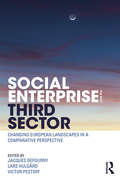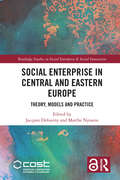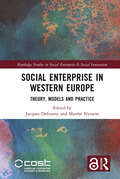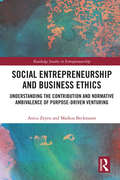- Table View
- List View
Social Enterprise In Emerging Market Countries
by Nicole Etchart Loïc ComolliNESsT is an organization that develops sustainable social enterprises to solve critical social problems in emerging market economies. NESsT believes that social enterprise is a powerful tool that provides marginalized communities the skills, accessibility and technology needed to overcome social barriers and break the cycle of poverty. Drawing on NESsT's unique methodology for identifying and building the capacity of early-stage social enterprises, as well as on surveys of relevant stakeholders, Social Enterprise in Emerging Market Countries provides a clear picture of where social enterprises are and where they need to go, and identifies key players in the social enterprise field and how they can take the bold steps needed to facilitate the growth and impact of these models. Etchart and Camolli focus on NESsT's research in Latin America and Central Europe, the two regions where it has operated for over 15 years, particularly in Argentina, Brazil, Chile, Ecuador, and Peru, with some cases from other countries in Latin America. For the purpose of illustrating important models and innovative programs and policies, this book also highlights cases and experiences from Central Europe.
Social Enterprise Spectrum: Philanthropy to Commerce
by J. Gregory DeesIndustry and Background Note
Social Enterprise Values and Processes: Entrepreneurship Studies from India (India Studies in Business and Economics)
by Satyajit Majumdar Edakkandi Meethal RejiThis edited volume is an interdisciplinary approach towards examining and integrating diverse theories, methodologies, and practices of social entrepreneurship. It highlights how social enterprises with their focus on resolving societal problems and driving social change, are critical for inclusive economic growth. The book is organized in three parts --- values, sustainability and social enterprise models; context, innovation and technology; and, perspectives and directions of future research in social entrepreneurship. The chapters contribute towards a better understanding of organizational and process dimensions of social and economic value creation, a relatively under-researched area in social entrepreneurship. They capture an extensive range of insights, analysis and case studies bringing together context specific dimensions and variables supportive of social enterprise creation and the development processes in social value creation. The book is useful for a wide range of audiences including social entrepreneurs, researchers, policy makers, development professionals, graduate and post graduate students seeking a deeper understanding of this evolving field. It also emphasizes practical guidance for individuals and organizations involved in social enterprise. It offers actionable insights, best practices, and real-world examples, enabling readers to apply the knowledge gained to their own contexts and effectively navigate the challenges and opportunities encountered in the field.
Social Enterprise and Special Events (Routledge Studies in Social Enterprise & Social Innovation)
by Julie OlberdingDuring the past twenty years, the field of nonprofit management has grown significantly in terms of the number of nonprofit organizations, number of people employed, and amount of funds raised. A key activity in nonprofit management has been organizing events, which are generally defined as "purposive gatherings of people." These purposes may include: increasing awareness about the nonprofit organization and its mission; raising funds to support programs and services related to its mission; engaging and developing individuals as donors, volunteers, and advocates; and enhancing the image of the organization and/or the broader community. Events in the modern era tend to be organized across the nonprofit, public, and private sectors. While a nonprofit organization may create and manage an event, corporations and businesses often contribute financial support and technical expertise in areas such as branding, marketing, and social media. Depending on the event type and size, a local government may provide the venue and public safety services, including police, fire, and ambulance. We can understand more about these mission-driven, cross-sectoral events by looking through the lens of social enterprise. Social enterprise has been defined as a venture that advances a social mission using business methods or market-based approaches. It is typically conceptualized as spanning sectors, particularly the nonprofit and private sectors. Social Enterprise and Special Events focuses on how market-based approaches can be used to help mission-driven gatherings achieve their purposes as efficiently, effectively, and sustainably as possible. These approaches include market research, brand development, cause marketing, gamification, liquidity, cash management, and clustering. The book also incorporates concepts important in the nonprofit and public sectors such as collaborative governance, social capital, political capital, community development, placemaking, and diversity.
Social Enterprise and the Third Sector: Changing European Landscapes in a Comparative Perspective
by Victor Pestoff Lars Hulgård Jacques DefournyThe concepts of social enterprise and social entrepreneurship are rapidly attracting increased attention in academic spheres and from policy-makers, as well as field workers who are setting up new initiatives or reshaping their organizations. These concepts are perceived as defining innovative and dynamic responses to major global challenges in today’s societies. The debate about social enterprise is now world-wide, with lively exchanges between American and European scholars. However, the research and landscapes still differ significantly in different regions, and diversity also exists within specific regions such as Europe. This book presents the most comprehensive set of contributions reflecting the European-wide debate, but with frequent connections to developments in other parts of the world. This book is a result of work carried out by members of the EMES International Research Network, which is a pioneer in this field. Social Enterprise and the Third Sector will appeal to all researchers who focus on the third sector, social economy and social enterprise, to MBA and postgraduate students, as well as to intellectual social enterprise leaders and practitioners. It will soon become a key reference for all those who want to explore the full richness of these concepts and follow this important academic debate.
Social Enterprise in Asia: Theory, Models and Practice (Routledge Studies in Social Enterprise & Social Innovation)
by Eric Bidet Jacques DefournyIn the absence of a widely accepted and common definition of social enterprise (SE), a large research project, the "International Comparative Social Enterprise Models" (ICSEM) Project, was carried out over a five-year period; it involved more than 200 researchers from 55 countries and relied on bottom-up approaches to capture the SE phenomenon. This strategy made it possible to take into account and give legitimacy to locally embedded approaches, thus resulting in an analysis encompassing a wide diversity of social enterprises, while simultaneously allowing for the identification of major SE models to delineate the field on common grounds at the international level. These SE models reveal or confirm an overall trend towards new ways of sharing the responsibility for the common good in today’s economies and societies. We tend to consider as good news the fact that social enterprises actually stem from all parts of the economy. Indeed, societies are facing many complex challenges at all levels, from the local to the global level. The diversity and internal variety of SE models are a sign of a broadly shared willingness to develop appropriate—although sometimes embryonic—responses to these challenges, on the basis of innovative economic/business models driven by a social mission. In spite of their weaknesses, social enterprises may be seen as advocates for and vehicles of the general interest across the whole economy. Of course, the debate about privatisation, deregulation and globalised market competition—all factors that may hinder efforts in the search for the common good–has to be addressed as well. The first of a series of four ICSEM books, Social Enterprise in Asia will serve as a key reference and resource for teachers, researchers, students, experts, policy makers, journalists and other categories of people who want to acquire a broad understanding of the phenomena of social enterprise and social entrepreneurship as they emerge and develop across the world.
Social Enterprise in Central and Eastern Europe: Theory, Models and Practice (Routledge Studies in Social Enterprise & Social Innovation)
by Jacques Defourny Marthe NyssensIn the last two decades, the quest for a widely accepted definition of social enterprise has been a central issue in a great number of publications. The main objective of the ICSEM Project (on which this book is based) was to show that the social enterprise field would benefit much more from linking conceptualisation efforts to the huge diversity of social enterprises than from an additional and ambitious attempt at providing an encompassing definition. Starting from a hypothesis that could be termed "the impossibility of a unified definition", the ICSEM research strategy relied on bottom-up approaches to capture the social enterprise phenomenon in its local and national contexts. This strategy made it possible to take into account and give legitimacy to locally embedded approaches, while simultaneously allowing for the identification of major social enterprise models to delineate the field on common grounds at the international level. Social Enterprise in Central and Eastern Europe – the last volume in a series of four ICSEM-based books on social enterprise worldwide — will serve as a key reference and resource for teachers, researchers, students, experts, policy makers, journalists and others who want to acquire a broad understanding of the social enterprise and social entrepreneurship phenomena as they emerge and develop in this region.
Social Enterprise in China (Routledge Studies in Management, Organizations and Society)
by Benedicte BrøggerThis book explores social innovation and entrepreneurship in China. Focusing on selected social enterprises and processes, it addresses the question of "why China?", not in terms of military, economic or political ambitions, but in the terms of social innovation and welfare policies. The analyses range from detailed ethnography to discussions of broad global trends. Despite vastly improved social conditions in the country, there are still unresolved issues that social enterprises address. The study elaborates on the complexities involved in their positioning between the state and their beneficiaries. Adding to the complexity is China’s dual system of circulation and the moral economy of ethnic minorities. The theoretical foundation of the study is the Durkheimian concept of the social contract. Its content is viewed as comprised of Maussian total social facts or guanxi, a similar Chinese framing, operationalised to particular socio-cultural configurations. The empirical cases document how social enterprises reposition elements in the various configurations in order to mobilise resources from their stakeholders. The book concludes that the discursive topology is altered in the process and the social contract is renewed in culturally meaningful, if paradoxical, ways. This book will be of interest to researchers, students and academics in the fields of business and social entrepreneurship, especially to those with a particular interest in the Chinese case.
Social Enterprise in China: State-Third Sector Relations and Institutional Effectiveness (Routledge Contemporary China Series)
by Echo Lei WangWang offers an empirically based exploration into work-integration social enterprises as a means for delivering social services in China. Focusing on the political economy of social enterprise development in China, Wang examines the nature of the relationship between the state and social enterprises and the implications of such relationships for their institutional effectiveness. She adopts a bottom-up approach that investigates indigenous practices embedded within the local political context. Common ground has been established internationally that the social enterprise model provides new ways of social service delivery that could potentially change and restructure the social welfare economy. However, the development path differs across social contexts, especially in an authoritarian country like China. This study provides insights into China's efforts to develop its social welfare sector and reinvigorate customary ideas about how public services could be better offered given the country's political economy. This book will be of great interest to both scholars of China’s political economy and those with an interest in the development of the social enterprise sector looking to see how this works in a Chinese context.
Social Enterprise in Latin America: Theory, Models and Practice (Routledge Studies in Social Enterprise & Social Innovation)
by Luiz Inácio Gaiger Marthe Nyssens Fernanda WanderleyIn the absence of a widely accepted and common definition of social enterprise (SE), a large research project, the "International Comparative Social Enterprise Models" (ICSEM) Project, was carried out over a five-year period; it involved more than 200 researchers from 55 countries and relied on bottom-up approaches to capture the SE phenomenon. This strategy made it possible to take into account and give legitimacy to locally embedded approaches, thus resulting in an analysis encompassing a wide diversity of social enterprises, while simultaneously allowing for the identification of major SE models to delineate the field on common grounds at the international level. These SE models reveal or confirm an overall trend towards new ways of sharing the responsibility for the common good in today’s economies and societies. We tend to consider as good news the fact that social enterprises actually stem from all parts of the economy. Indeed, societies are facing many complex challenges at all levels, from the local to the global level. The diversity and internal variety of SE models are a sign of a broadly shared willingness to develop appropriate although sometimes embryonic—responses to these challenges, on the basis of innovative economic/business models driven by a social mission. In spite of their weaknesses, social enterprises may be seen as advocates for and vehicles of the general interest across the whole economy. Of course, the debate about privatisation, deregulation and globalised market competition—all factors that may hinder efforts in the search for the common good–has to be addressed as well. The second of a series of four ICSEM books, Social Enterprise in Latin America will serve as a key reference and resource for teachers, researchers, students, experts, policy makers, journalists and other categories of people who want to acquire a broad understanding of the phenomena of social enterprise and social entrepreneurship as they emerge and develop across the world.
Social Enterprise in Western Europe: Theory, Models and Practice (Routledge Studies in Social Enterprise & Social Innovation)
by Jacques DefournyIn the last two decades, the quest for a widely accepted definition of social enterprise has been a central issue in a great number of publications. The main objective of the ICSEM Project on which this book is based was to show that the social enterprise field would benefit much more from linking conceptualisation efforts to the huge diversity of social enterprises than from an additional and ambitious attempt at providing an encompassing definition. Starting from a hypothesis that could be termed "the impossibility of a unified definition", the ICSEM research strategy relied on bottom-up approaches to capture the social enterprise phenomenon in its local and national contexts. This strategy made it possible to take into account and give legitimacy to locally embedded approaches, while simultaneously allowing for the identification of major social enterprise models to delineate the field on common grounds at the international level. Social Enterprise in Western Europe –the third volume in a series of four ICSEM-based books on social enterprise worldwide – will serve as a key reference and resource for teachers, researchers, students, experts, policy makers, journalists and others who want to acquire a broad understanding of the social enterprise and social entrepreneurship phenomena as they emerge and develop in this region.
Social Enterprise, Health, and Wellbeing: Theory, Methods, and Practice (Routledge Studies in Social Enterprise & Social Innovation)
by Michael J. Roy Jane FarmerIn recent decades, governments have promoted social enterprise as a means to address welfare and tackle disadvantage. Early academic work on social enterprises reflected this development and engaged with their ability to deliver and create jobs, work towards remedial environmental goals, and address a range of societal challenges. More recently, researchers have started to investigate the broader potential of social enterprise for the wellbeing of people and the planet. In this context, this book aims to answer the question: In what ways can social enterprises improve the health and wellbeing of individuals and communities? The chapters in this edited collection take different perspectives on assessing how social enterprises address disadvantage and deliver health and wellbeing impacts. Drawing on evidence from international research studies, Social Enterprise, Health, and Wellbeing: Theory, Methods, and Practice presents the ‘first wave’ of innovative research on this topic and provides a platform of evidence to inspire the next generation of scholarly and policy interest. Drawing on the cutting edge of interdisciplinary research in the field, this book will be of interest to researchers, academics, policymakers, and students in the fields of entrepreneurship, public and social policy, community development, public health, human geography, and urban planning.
Social Enterprise, Health, and Wellbeing: Theory, Methods, and Practice (Routledge Studies in Social Enterprise & Social Innovation)
by Michael Roy Jane FarmerIn recent decades, governments have promoted social enterprise as a means to address welfare and tackle disadvantage. Early academic work on social enterprises reflected this development and engaged with their ability to deliver and create jobs, work towards remedial environmental goals, and address a range of societal challenges. More recently, researchers have started to investigate the broader potential of social enterprise for the wellbeing of people and the planet.In this context, this book aims to answer the question: In what ways can social enterprises improve the health and wellbeing of individuals and communities? The chapters in this edited collection take different perspectives on assessing how social enterprises address disadvantage and deliver health and wellbeing impacts. Drawing on evidence from international research studies, Social Enterprise, Health, and Wellbeing: Theory, Methods, and Practice presents the ‘first wave’ of innovative research on this topic and provides a platform of evidence to inspire the next generation of scholarly and policy interest. Drawing on the cutting edge of interdisciplinary research in the field, this book will be of interest to researchers, academics, policymakers, and students in the fields of entrepreneurship, public and social policy, community development, public health, human geography, and urban planning.
Social Enterprise: Accountability and Evaluation around the World
by Simon Denny Fred SeddonSocial enterprise has become a much discussed term in recent years, often in conjunction with the public sector - the idea that entrepreneurship might somehow step in and save the public purse has taken hold in a number of areas. This book introduces and explains the terminology surrounding social enterprise and brings much-needed rigour to proceedings by demonstrating how this can be measured, evaluated and held accountable. A range of validated evaluation measures, tools and techniques, such as ‘SROI’, the ‘Outcomes Star’ and randomised control trials, are presented in individual research projects, conducted by an exciting and eclectic mix of international authors who are recognised experts in the field of social enterprise. Wrapping up with the ground-breaking use of a General Self-Efficacy scale, a reflective critique of social finance and a challenge to the actual concept of social enterprise, the book discusses the potential disadvantages that can arise from the commodification of social enterprise activities, resulting in a fascinating summary of current thinking surrounding this topic.
Social Enterprise: At the Crossroads of Market, Public Policies and Civil Society (Routledge Studies in the Management of Voluntary and Non-Profit Organizations)
by Marthe Nyssens Sophie Adam Toby JohnsonIn one of its previous books, the EMES European Research Network traced the most significant developments in 'social entrepreneurship' emerging inside the third sector in Europe. Building upon that seminal work, this volume presents the results of an extensive research project carried out over a four-year period of a comparative analysis of 160 social enterprises across eleven EU countries. It breaks new ground in both its articulation of multidisciplinary theoretical frameworks and its rigorous analysis of empirical evidence based on a homogenized data collection methodology. Looking at work intergration, it is structured around a number of key themes (multiple goals and multiple stakeholders, multiple resources, trajectories of workers, public policies) developed through a transversal European analysis, and is illustrated with short country experiences that reflect the diversity of welfare models across Europe. With contributions from an impressive list of academics, all members of the EMES European Research Network, this rich follow-up volume to The Emergence of Social Enterprise is essential reading for academics, researchers and students in the fields of the third sector and social policies.
Social Enterprise: Cases and Analysis for Understanding Social Business
by Malcolm Harper Nadiya ParekhThis book introduces students and others to the discipline of social entrepreneurship, which encourages the creation of enterprises that are socially inclusive yet economically and ecologically sustainable. In each chapter there is a mix of case studies about internationally well-known enterprises and other more local enterprises which are totally new. The book leads its readers to understand and appreciate entrepreneurial issues and to engage themselves in community-based activities. Social Enterprise helps readers to: analyze and articulate the blend of social, environmental and economic values which is present in all kinds of enterprise understand the issues involved in translating good intentions with multiple goals into focused, sustainable and practical actions propose alternative social enterprise management strategies based on their own analysis of case studies of entrepreneurial endeavors that are perceived to be ‘social’ The authors take a pragmatic yet critical approach, and this book should be core or recommended reading for Social Entrepreneurship and Social Enterprise modules at advanced undergraduate, postgraduate and MBA levels.
Social Enterprise: Private Initiatives for the Common Good
by J. Gregory DeesPresents a model for understanding how private social-purpose ventures (nonprofit and for-profit) differ from traditional business firms in both their objectives and methods of operation. Identifies six dimensions that are useful for understanding the differences. Also discusses the role of social enterprise in society and current trends creating opportunities for social entrepreneurship.
Social Enterprises
by Benjamin Gidron Yeheskel HasenfeldPresents an organizational perspective of social enterprises, which allows us to analyze issues such as their governing structure, their modes of operation and their marketing strategies, and to begin to formulate some theoretical constructs on how these entities can survive and thrive.
Social Enterprises and Impact Investors: Partnerships that Sustain Emerging Countries (Advances in Theory and Practice of Emerging Markets)
by Ramanie Samaratunge Jeremiah Arigu Emmanuel Daniel PrajogoThis book explores how social enterprises and impact investors use inter-organizational partnerships to pursue contemporary socio-economic interests in emerging countries. It looks at the ways in which enterprises and investors collaborate to create hybrid organizations by matching social and commercial focus: a solid business orientation and social mission combined to create social value, sustainable impact and profit. Using Nigeria as a case study, the authors provide evidence of the success of these collaborations through partner alignment of compatible management, mission, goals, reputation and investment. This book provides novel insights for researchers, scholars, academics and policy makers into what types of complimentary resources define the exchange value between hybrid organizations. It also provides practical knowledge for practitioners who wish to collaborate with emerging countries and guidance for investors in creating a portfolio to attract the right enterprises.
Social Entrepreneurship
by Anders Lundström Chunyan Zhou Yvonne Von Friedrichs Elisabeth SundinThis contributed volume features state-of-the-art research from ten different countries on implementation, institutionalization and the future prospects of social entrepreneurship. This volume aims at bringing together research that considers the context of economy, politics and cultural issues combining with the needs of social and human development. By conceptualizing the notion of social entrepreneurship and societal entrepreneurship, this volume aims to disseminate the numerous streams of research and theory of social entrepreneurship to educators, libraries, scholars, non-profit researchers, public policy makers, practitioners, undergraduate and graduate students, and any organization or person interested in staying abreast of advances in this area. It is also an important reference book for teachers, students and faculty interested in conducting research or teaching social entrepreneurship.
Social Entrepreneurship
by Wolfgang Bielefeld Chao GuoSocial entrepreneurship explainedSocial entrepreneurship is a hot topic in public and non-profit management. Organizations everywhere are looking for innovative ways to respond to financial, social, and regulatory pressures. The next generation of transformative leaders will be risk takers who know how to face even the biggest challenges using market-driven strategies that get results. This book contains everything students and professionals need to know about the cutting-edge practice of social entrepreneurship.In Social Entrepreneurship, you'll learn how to read markets and environments to identify opportunities for entrepreneurial activity. Then, the authors show to convert opportunities into successful ventures: one-time initiatives, ongoing programs and new, mission-driven organizations are all covered. Sector-specific strategies and recommendations guide readers directly to the techniques that will have the biggest impact.Employs an evidence-based approach to help organizations achieve goals more efficientlyOffers advice on taking advantage of new technologies and untapped resources using the most current approachesWritten by renowned experts in the field of social entrepreneurshipAuthors Guo and Bielefeld have been instrumental in advancing the study of social entrepreneurship, and they understand the trends and currents in the field. They bring readers up to date and ready them to begin implementing changes that really make a difference. In non-profits and government, leadership is already becoming synonymous with social entrepreneurship, and this book is its foundation.
Social Entrepreneurship Business Models
by Katharina SommerrockExploring how social entrepreneurial organizations are actually able to create solutions that tackle social and ecological problems this book makes out incentives as a key element of their value creation and identifies specific strategies for social value creation.
Social Entrepreneurship For Dummies
by Mark Durieux Robert StebbinsDiscover how to bring social responsibility to your businessIn today's business world, your bottom line isn't measured by your company's financial performance alone. Social Entrepreneurship For Dummies shows you how to implement social responsibility to your business plan in order to increase your bottom line.This book helps any social entrepreneur gain the necessary skills needed to change the system and spread the solution, while providing explanations of the most successful business tools being used today.A complete reference on the ideas and processes associated with social entrepreneurship Provides a foundation and business plan for those looking to create their own socially oriented business ventureSocial Entrepreneurship For Dummies gives you the trusted and friendly advice you need to get on your way toward social responsibility!
Social Entrepreneurship Strategies and Social Sector Sustainability: A Caribbean Context
by Indianna Minto-Coy Ambica MedineThis book examines the social entrepreneurship strategies of nonprofit organizations (NPOs), with a focus on the Caribbean social sector. In addressing the conceptual ambiguities from an academic and experiential perspective, it aims to provide a much-needed reflection on social entrepreneurship (SE), including in developing contexts. Through a comparative analysis of the experiences of NPOs from the Caribbean, the authors demonstrate the applicability of SE for NPO sustainability and as an opportunity for social sector performance improvement. Blending both quantitative and qualitative methodologies, this work is a useful base for researchers wanting to advance the mission of theory and methodological development toward maturing the field of social entrepreneurship.
Social Entrepreneurship and Business Ethics: Understanding the Contribution and Normative Ambivalence of Purpose-driven Venturing (Routledge Studies in Entrepreneurship)
by Anica Zeyen Markus BeckmannSocial entrepreneurs are change makers that aim to solve society’s unsolved problems. Not surprisingly, social entrepreneurship has thus created high expectations. To better understand the potential as well as the limitations of social entrepreneurship, however, a more nuanced approach is needed in two ways. First, social entrepreneurship is a multi-level phenomenon. It spans macro-level questions as well as meso-level questions and, finally, micro-level questions. If we really want to understand social entrepreneurship, we need to bring together all three levels of analysis and see how they are connected. Second, while social entrepreneurship can certainly produce socially desirable outcomes, we also need a critical perspective to capture potential undesirable effects that social entrepreneurship can cause, often unintendedly, in society, in markets, in organizations, and for individuals. To this end, an ethical perspective can help complement the positive analysis of social entrepreneurship with a discussion of the normative implications of its potential "dark side". Looking at social entrepreneurship from both a multi-level analysis and an ethical perspective, Social Entrepreneurship and Business Ethics takes the reader on a journey through the "bright side" as well as the potential "dark side" of social entrepreneurship for societies, organizations, and individuals. Highlighting both, this book not only seeks to provoke researchers and students to advance their understanding of social entrepreneurship. It also hopes to help practitioners to better realize the positive contributions of social entrepreneurship for society.






















